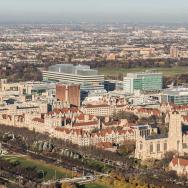A new University of Chicago fund designed to support and scale community and academic violence reduction efforts is now accepting applications through Sept. 1, 2022.
In a message to the University community on July 28, President Paul Alivisatos and Provost Ka Yee C. Lee announced the launch of the Violence Intervention Fund to support evidence-based violence reduction and prevention efforts by investing in local programs and building the evidence base for intervention making a significant impact. The $15 million fund, which will support work over a period of three years, is part of the University’s broader efforts to improve community safety in a collaborative way, including both enhanced security measures and community-driven interventions to address the root causes of violence.
Alivisatos announced in January the University’s plans to develop the fund. In the months since, the Office of Civic Engagement initiated an input process that included community residents, public safety community leaders, nonprofit leaders affiliated with the University’s Community Programs Accelerator, and UChicago Medicine Community Advisory Council members, among others.
“The Violence Intervention Fund is the University’s latest investment in violence prevention and community safety,” Alivisatos said. “It also serves as an opportunity to catalyze, support and help scale high-impact programs in collaboration with South Side community partners to reduce the violence that affects our shared community.”
This fund will add to to the University’s ongoing investment in violence reduction initiatives focused on South Side communities and residents, particularly efforts supporting youth, people at elevated risk for involvement with violence (either as offenders or victims), and trauma reduction programs. Already this summer, these funds have supported three pilot programs focusing on violence recovery: a job training and entrepreneurship program in collaboration with Emerald South for local residents that will transform vacant land in Washington Park; a Chicago Public Schools workforce mentoring program for disengaged youth; and UChicago Medicine’s Violence Recovery Program.
In addition to these initial commitments, the Violence Intervention Fund will support two application tracks. “Pilot” track grants will invest for one-year terms in promising new violence prevention programs or interventions that are milestone-driven and include a data collection and evaluation component. “Scale” track grants will invest in strengthening and scaling existing, evidence-based violence intervention programs that have the highest probability of reducing violence in the University’s nine-neighborhood focus area: Douglas, Grand Boulevard, Greater Grand Crossing, Hyde Park, Kenwood, Oakland, South Shore, Washington Park and Woodlawn. Scale grants will support projects for up to three years, with renewal decisions based on demonstrated progress.
Proposals meeting the selection criteria will be accepted from University academics and nonprofit community organizations, and faculty/community partnerships will receive priority consideration. The fund’s first request for applications is now open. Applications are due Sept. 1, 2022, with Round 1 notification for pilot and scale applications planned for early October 2022. An information session will be held on Aug. 2 for community organizations interested in learning more about the fund and the selection criteria. Learn more at the Violence Intervention Fund website.
Development of the Violence Intervention Fund builds on the University’s robust existing violence prevention initiatives and partnerships, including those based at UChicago Medicine; the Chicago Center for Youth Violence Prevention at the Crown Family School of Social Work, Policy, and Practice; the Harris School of Public Policy’s Urban Labs; and other work across the University such as scholarship focused on education, housing, employment and poverty alleviation.
The Violence Intervention Fund is the latest addition to these and other established violence prevention and recovery initiatives across UChicago’s campus. Information about grant recipients and project impact will be shared regularly, along with updates about related efforts.
